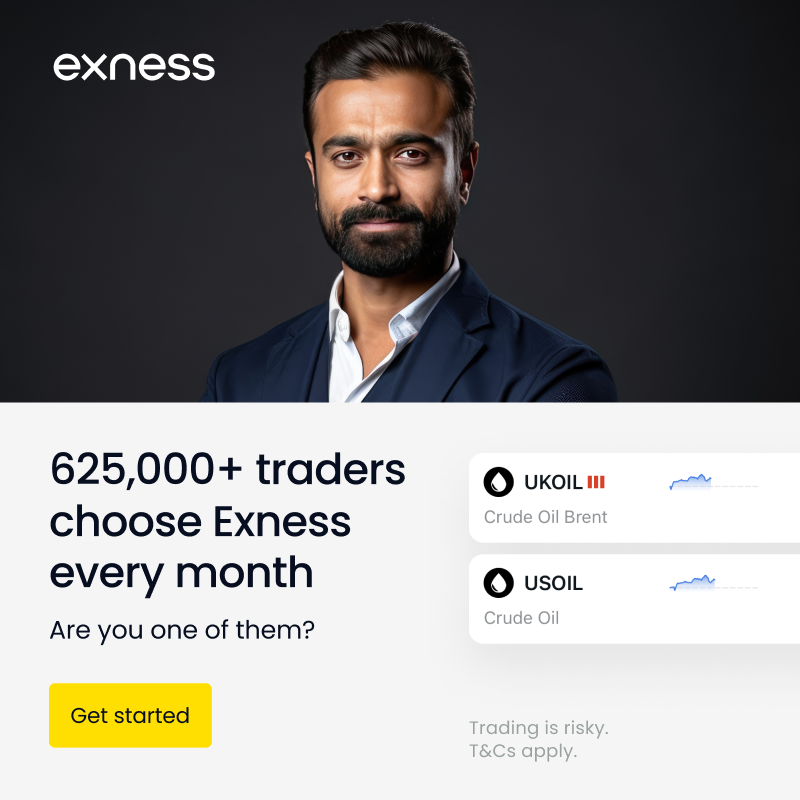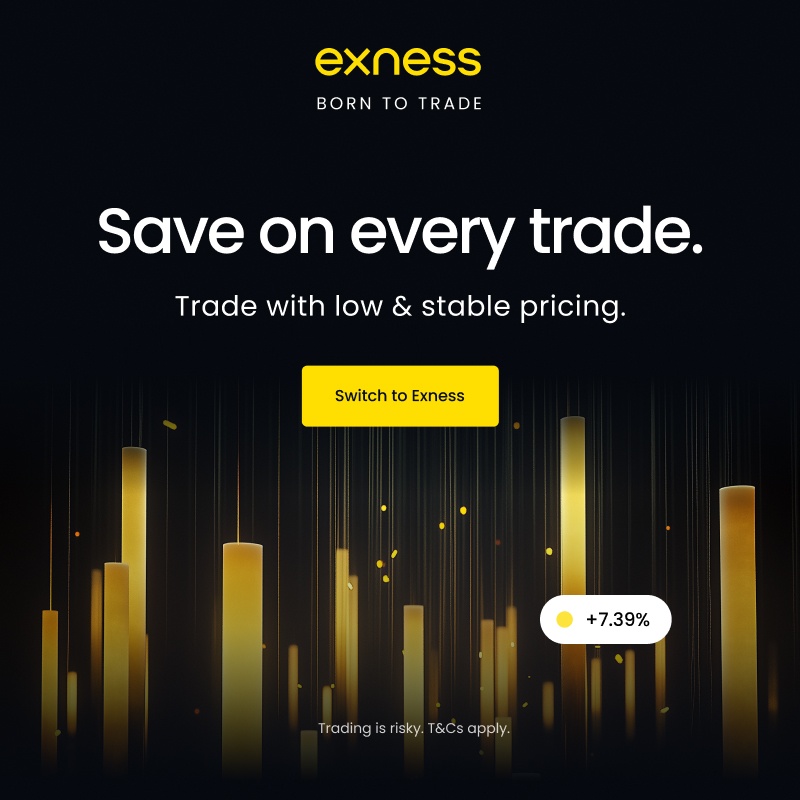
7 minute read
Exness India Review 2025: Is It the Right Forex Broker for Indian Traders?
from Exness
by Exness Blog
Forex trading in India has surged in popularity, driven by increased access to global markets and a growing interest in financial independence. Among the many brokers vying for attention, Exness stands out as a globally recognized platform. But is Exness the right choice for Indian traders in 2025? This comprehensive Exness India review explores its features, regulatory status, trading conditions, and potential drawbacks, offering an in-depth analysis to help you make an informed decision.

✅ Trade with Exness now: Open An Account or Visit Brokers 👈
What Is Exness?
Founded in 2008, Exness is a Cyprus-based forex and CFD broker operating in over 130 countries, including India. With over 1 million active clients and a monthly trading volume exceeding $4 trillion, Exness has cemented its position as a leading multi-asset broker. It offers trading in forex, cryptocurrencies, commodities, indices, and stocks, catering to both novice and experienced traders. The platform is regulated by multiple authorities, including the Financial Conduct Authority (FCA) in the UK, CySEC in Cyprus, FSCA in South Africa, and FSA in Seychelles, ensuring a secure trading environment.
Exness is known for its low spreads, high leverage, and user-friendly platforms, including MetaTrader 4 (MT4), MetaTrader 5 (MT5), and its proprietary Exness Terminal. Indian traders, in particular, are drawn to its low minimum deposit, fast withdrawals, and robust customer support. However, the broker’s regulatory status in India and recent concerns raised by users require careful consideration.
Is Exness Legal in India?
Forex trading in India is regulated by the Reserve Bank of India (RBI) and the Securities and Exchange Board of India (SEBI). While forex trading is legal, it is restricted to specific currency pairs (e.g., USD/INR, EUR/INR) and must be conducted through SEBI-regulated brokers or authorized dealers. Exness is not regulated by SEBI or RBI, meaning it operates as an offshore broker for Indian traders. This lack of local regulation does not make Exness illegal, but traders must ensure compliance with FEMA (Foreign Exchange Management Act) guidelines to avoid legal issues.
Despite this, many Indian traders use Exness due to its strong international regulatory framework and competitive trading conditions. The broker adheres to strict financial standards, maintains segregated client funds, and employs anti-money laundering (AML) and know-your-customer (KYC) protocols to ensure security. Indian traders should consult a financial advisor to understand the legal implications of trading with an offshore broker like Exness.
Key Features of Exness for Indian Traders
1. Low Minimum Deposit
Exness is highly accessible, with a minimum deposit of just $10 for its Standard and Standard Cent accounts. This low entry barrier makes it ideal for beginners or traders with limited capital. For professional accounts like Pro, Raw Spread, and Zero, the minimum deposit is $200, still competitive compared to other brokers.
2. Competitive Spreads and Fees
Exness offers some of the tightest spreads in the industry, particularly for forex pairs, gold (XAUUSD), and oil (USOIL). Its proprietary pricing algorithms ensure stable spreads even during volatile market conditions. For example, the Raw Spread and Zero accounts offer spreads starting from 0.0 pips, with a fixed commission of $3.50 per lot per side. Additionally, Exness does not charge swap fees on overnight positions for popular assets, making it cost-effective for long-term traders.
3. High Leverage Options
Exness provides customizable leverage up to 1:2000 for standard accounts and unlimited leverage for eligible traders who meet specific trading volume requirements (e.g., 5 lots for standard accounts, 500 lots for cent accounts). This flexibility appeals to high-risk traders but requires careful risk management to avoid significant losses.
4. Trading Platforms
Indian traders can choose between MT4, MT5, and the Exness Terminal, all of which support desktop, mobile, and web trading. The platforms are intuitive, offering advanced charting tools, technical indicators, and fast execution with 98% of pending orders executed slippage-free. Exness also provides free demo accounts with unlimited virtual funds, allowing traders to practice strategies risk-free.
5. Fast Deposits and Withdrawals
Exness supports multiple payment methods, including bank transfers, credit/debit cards, and e-wallets, with instant withdrawals for most methods. However, recent posts on X have raised concerns about the sudden removal of UPI and bank deposit options for Indian users, citing an “internal policy” without clear explanation. While Exness has historically offered reliable payment systems for Indian traders, this development warrants caution until clarified.
6. 24/7 Customer Support
Exness provides multilingual customer support in over 14 languages, including Hindi, via live chat, email, and phone. Indian traders have praised the platform’s responsive support, though some have reported delays in resolving withdrawal issues.
7. Educational Resources
Exness offers a range of educational content, including articles, tutorials, and videos on its blog and YouTube channel. While the material covers beginner and advanced topics, such as trading strategies and algorithmic trading with Python, some reviewers suggest that Exness could improve by adding interactive webinars and more in-depth courses.

✅ Trade with Exness now: Open An Account or Visit Brokers 👈
Pros of Trading with Exness in India
Low-Cost Trading: Tight spreads, low fees, and swap-free options reduce trading costs.
Accessibility: A $10 minimum deposit and demo accounts make it beginner-friendly.
Wide Asset Range: Over 100 currency pairs, cryptocurrencies, commodities, and indices provide diverse trading opportunities.
Reliable Platforms: MT4, MT5, and Exness Terminal ensure a seamless trading experience.
Strong Regulation: FCA, CySEC, and other licenses enhance trustworthiness.
Fast Execution: Strategically located servers ensure quick and reliable trade execution.
Cons of Trading with Exness in India
Regulatory Concerns: Not regulated by SEBI or RBI, which may pose legal risks for Indian traders.
Limited Product Portfolio: Focused primarily on forex and CFDs, with fewer options for stocks or other assets compared to competitors.
Withdrawal Issues: Some Indian traders have reported delays or issues with withdrawals, particularly after the removal of UPI and bank deposit options.
Educational Gaps: The lack of advanced courses and interactive content may limit learning for experienced traders.
Market Maker Model: As a market maker, Exness acts as a counterparty to trades, which may introduce a conflict of interest, though transparency measures like public price data mitigate this.
User Feedback and Trustworthiness
Exness enjoys a strong reputation, with a 4-star rating on Trustpilot based on over 18,000 reviews. Indian traders have praised its user-friendly interface, fast withdrawals, and reliable customer service. One user, trading since 2012, highlighted the platform’s superb services for Indian customers, including local payment systems. However, negative reviews exist, with some users reporting withdrawal delays and poor support responses. For instance, a trader claimed Exness failed to process a withdrawal after 40 days, citing vague excuses.
Recent sentiment on X reflects frustration among Indian traders due to the sudden removal of UPI and bank deposits, with accusations of lacking transparency. While these claims are inconclusive without further evidence, they suggest a need for Exness to address payment concerns promptly to maintain trust.
How Exness Compares to Alternatives
For Indian traders seeking SEBI-regulated brokers, alternatives like Zerodha or Angel One may be safer options, though they offer limited forex trading capabilities. Offshore brokers like eToro or XM provide similar features to Exness but differ in fees, leverage, and asset offerings. For instance, eToro emphasizes social trading, while XM offers higher bonuses but less competitive spreads. Indian traders should compare these platforms based on their trading goals and risk tolerance.
Tips for Indian Traders Using Exness
Understand Local Regulations: Consult a financial advisor to ensure compliance with RBI and SEBI guidelines.
Start with a Demo Account: Practice strategies risk-free before committing real funds.
Manage Leverage Carefully: High leverage (1:2000) can amplify both profits and losses.
Monitor Payment Options: Verify available deposit and withdrawal methods, especially after recent changes to UPI and bank options.
Leverage Educational Resources: Use Exness’s blog and tutorials to enhance your trading skills.
Conclusion: Is Exness Right for You?
Exness is a compelling choice for Indian traders seeking low-cost, flexible, and diverse trading options. Its tight spreads, low minimum deposit, and robust platforms make it suitable for both beginners and professionals. However, the lack of SEBI regulation, recent payment issues, and limited educational content are notable drawbacks. Indian traders should weigh these factors, ensure compliance with local laws, and monitor Exness’s response to recent concerns before committing.
For those prioritizing affordability and global regulation, Exness remains a strong contender in 2025. To explore Exness further, visit their official website or try a demo account to test its features firsthand.
✅ Trade with Exness now: Open An Account or Visit Brokers 👈
Read more:










